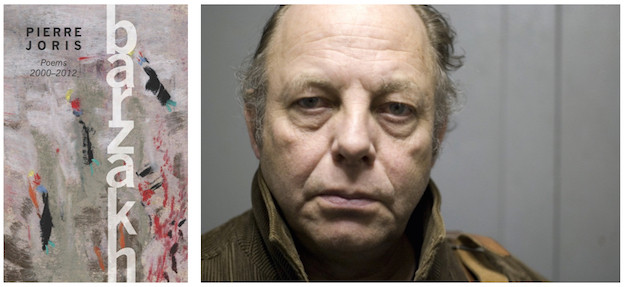Norman Weinstein on “Barzakh”
Just published on Jacket2; below the opening paras & the link to the whole piece.
Healer and hunter:
A review of Pierre Joris’s ‘Barzakh’

Barzakh: Poems 2000–2012
Pierre Joris
Black Widow Press 2014, 306 pages, $19.95, ISBN 996007924
My father was a healer & a hunter. Is it any surprise I became a poet & translator? (“Nimrod,” 121)
“Nothing truer than fragment” — I’m quoting Robert Kelly — & I love the coupling of “truth” which in our Western culture is always associated with the simple, the whole, the complete with the notion of the fragment, which can only be incomplete, multiple, partial so that the notion of a “true fragment” is de facto oxymoronic” (“Maintenant #94 — Pierre Joris: An interview with Pierre Joris by S. J. Fowler)
In identifying archetypally with healer and hunter, Pierre Joris brings his poems of the twenty-first century into an ever more fervid and restless search mode. Healers and hunters operate under the most severe time constraints, with survival at stake. Which is why Robert Kelly’s sage half-truth “Nothing truer than fragment” needs to be fleshed out. What Joris does with fragments, with increasing acuity decade after decade in his poems, is search and sift among fragments with urgent speed and decisiveness — nomad on the run — to shape fragments so they coalesce into culturally vibrant patterns of meaning. Think of Pound’s image of iron filings magnetized, constellated into an image of a rose. Like Pound, Joris finds fragments that move through his field of attention at high-velocity. Often from source to target language(s), faithful to his Luxemborgian-cum-American self whose oscillations in youth between German and French gave rise to his unsettling-settling home language of American English. Heard in the play of his ear and intellect, a true world music mix from a hydrogen jukebox in “A Poem in Noon”:
where our r, French,
rolls & roils
into the dark of a round
wonder, a drop in
a bucket, to re-emerge
hissing wet, somewhat
sheepish, but not ain
so difficult to pronounce
for northern claritas. (130)
Roaming among romance languages — hunting in the terra incognita of romance — Joris finds fragments of extraordinary resonance among the exiled: Dante (“This afternoon Dante”), Jabes (“Reading Edmond Jabes”), and Celan (“Shakespeare sonnet #71, re-Englished after Paul Celan’s German version without consulting the original”). Hunting for fragments among them, carrying them with him on his US-Maghreb transits — he shares with his beloved exiles an acute moral vision, sparks crystallizing fragments into a poem as a patterned integrity, as dynamically whirling as a Calder mobile, intently defining exilic hideaways, latently healing/reweaving a ripped social fabric. Set to music in this book’s finale working through news fragments of yet another leaking oil tanker catastrophe at sea, “The Gulf: From Rigwreck to Disaster”:
what we know is oil & water do not mix
what we know is fish & oil do not mix
what we know is you & I have to mix
what we know is you & I have to live (175)
[ctd here]

 Poasis II: Selected Poems 2000-2024
Poasis II: Selected Poems 2000-2024 “Todesguge/Deathfugue”
“Todesguge/Deathfugue” “Interglacial Narrows (Poems 1915-2021)”
“Interglacial Narrows (Poems 1915-2021)” “Always the Many, Never the One: Conversations In-between, with Florent Toniello”
“Always the Many, Never the One: Conversations In-between, with Florent Toniello” “Conversations in the Pyrenees”
“Conversations in the Pyrenees” “A Voice Full of Cities: The Collected Essays of Robert Kelly.” Edited by Pierre Joris & Peter Cockelbergh
“A Voice Full of Cities: The Collected Essays of Robert Kelly.” Edited by Pierre Joris & Peter Cockelbergh “An American Suite” (Poems) —Inpatient Press
“An American Suite” (Poems) —Inpatient Press “Arabia (not so) Deserta” : Essays on Maghrebi & Mashreqi Writing & Culture
“Arabia (not so) Deserta” : Essays on Maghrebi & Mashreqi Writing & Culture “Barzakh” (Poems 2000-2012)
“Barzakh” (Poems 2000-2012) “Fox-trails, -tales & -trots”
“Fox-trails, -tales & -trots” “The Agony of I.B.” — A play. Editions PHI & TNL 2016
“The Agony of I.B.” — A play. Editions PHI & TNL 2016 “The Book of U / Le livre des cormorans”
“The Book of U / Le livre des cormorans” “Memory Rose Into Threshold Speech: The Collected Earlier Poetry of Paul Celan”
“Memory Rose Into Threshold Speech: The Collected Earlier Poetry of Paul Celan” “Paul Celan, Microliths They Are, Little Stones”
“Paul Celan, Microliths They Are, Little Stones” “Paul Celan: Breathturn into Timestead-The Collected Later Poetry.” Translated & with commentary by Pierre Joris. Farrar, Straus & Giroux
“Paul Celan: Breathturn into Timestead-The Collected Later Poetry.” Translated & with commentary by Pierre Joris. Farrar, Straus & Giroux